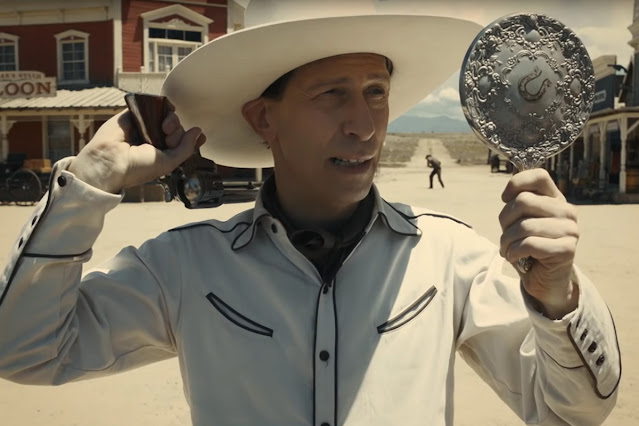The Ballad of Buster Scruggs
Some people feel compelled to rate each of THE BALLAD OF BUSTER SCRUGGS' six tales separately. I'm not among them. The Coen brothers' latest is an anthology of life in the American West, each story highly concerned with mortality, with a few weaving in themes of greed. I found all chapters (introduced onscreen in an old tome complete with illustrations) to be effective and strong. Reflection upon the movie has only strengthened it. Once again, Joel and Ethan Coen have dazzled our hearts and minds with mise-en-scene and narrative meat. All presented in their inimitable style, carefully crafted and rich with detail.
For me, the segments were well sequenced. The tone shifts are, as always, beautifully modulated. Things start off with a wink and a bang with Tim Blake Nelson as the title character, a singing outlaw breaking the fourth wall. Then James Franco turns up as another outlaw who becomes intimate with nooses. But then "Meal Ticket" darkens the palatte and is one of the saddest, most disturbing tales I've seen lately. It's good to see Liam Neeson in something besides another TAKEN movie as well. But "Meal Ticket" truly belongs to Harry Melling. The use of works by Shelley, Shakespeare, and from Lincoln's Gettysburg Address punctuate.
Oh, that last chapter also quotes the Holy Bible, and THE BALLAD OF BUSTER SCRUGGS (some of which is based on short stories by Jack London and others) plays like, dare I say it, some lost parables that might've at least fit in the Apocrypha. In the film's longest segment, "The Gal Who Got Rattled", theological discussions are common. A wagon trainer and a young woman discuss the mystery of life and faith (a common Coens subject) over campfires as she ponders a thorny situation. I heard a line that seemed at odds with the Coens' sometimes nihilistic view of life:
"I believe uncertainty is appropriate for this world. Only in the next do we have certainty."
Apply it to the religion of your choice, I suppose. But among the folks in this era, you know to whom they were prayin'. And how about that old gold prospector (played by none other than Tom Waits), forever counting gold specks out of the stream, and tearing up the soil to find more? How his story, um, pans out will remind Christians of a few verses. The final segment, "The Mortal Remains" is a fairly obvious allusion to that passage between Life and Death. Reapers, if you will. The talkiest of the bunch, this one allows some great discourse on "moral and spirtual hygiene", and man's heart in general. What is the human experience? What is man's role? Designation? What is genuine?
Much has been made about the film's limited theatrical release and widespread one on Netflix, who financed the picture. The Netflix model has been a concern for me, further blurring what is television and what is what I will always consider a superior medium, film. Scorsese and Cuaron have projects upcoming on the streaming service. To boot, THE BALLAD OF BUSTER SCRUGGS is the Coens' first movie shot digitally, something that is quite obvious in certain scenes. I have to admit, this movie looked damned good and still felt cinematic on my T.V. I would've seen this on the big screen were it available. The Coens are a handful of directors for whom I make special effort to see their works in such a fashion. But the works need to be seen, period. God bless Netflix?



Comments